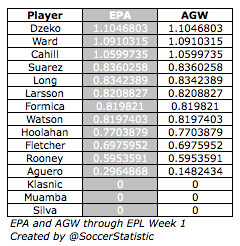Expected Points Added (EPA) Data Through EPL Week 1
Ford Bohrmann
Before the season I promised to post Expected Points Added (EPA) totals after each week of the season. Here are the EPA totals from week 1. If you don't know what EPA is, check out a full explanation here.
To summarize it very basically, EPA is the total measure of how much each player's goals add to team's expected points total. That is why you see some EPA's of 0 below. These players scored goals that added nothing to the teams expected points total (for example, a team is up 3-0 and is already going to win, and a player scores a 4th in the 90th minute. This does not add to the team's chance of winning technically, because the team is already very likely to win.)
Average Goal Weight (AGW) is just EPA divided by the number of goals a player has scored. This measures how important, on average, a player's goals are. It can show us that a player consistently scores clutch goals (high AGW) or that they are scoring useless goals in blowouts (low AGW).

Dzeko has the highest EPA from his go ahead goal in the 57th minute. This equated to a little more than a point for City. Klasnic, Muamba, and Silva all scored goals that added no expected points for their team.
If you have any questions feel free to ask in the comment section. I'll be super busy this week between moving in to my apartment at school and 3-a-days for preseason but I'll try to keep some posts coming.

